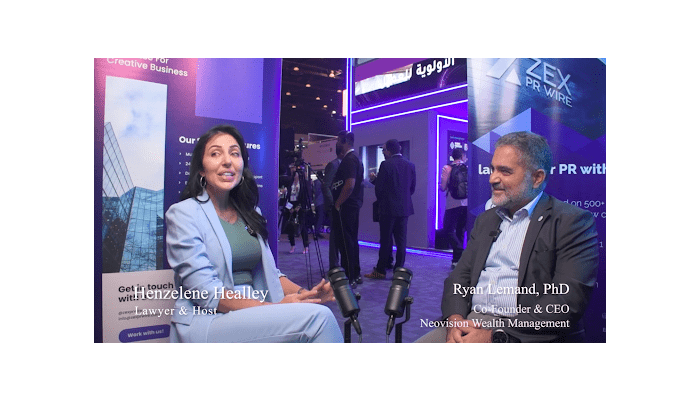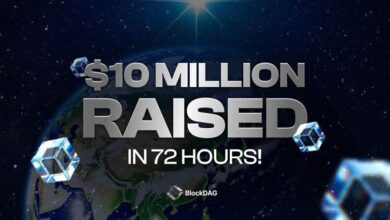Ryan Lemand on the role of Mancos in fund creation and management

Ryan Lemand, Co-Founder and CEO of Neovision Wealth Management, spoke to Henzelene Healley at the DIFC Fintech Summit.
See full Interview here:
https://youtu.be/Jsz576KqDCI?si=aRyy0GZWN_a16wk3
With over 20 years’ experience in the financial sector, Lemand has accrued extensive expertise in investment management, financial risk management, and investments to create value and impact for various financial organizations and initiatives.
Neovision Wealth Management, based in the Abu Dhabi Global Market (ADGM) Financial Zone, carries out wealth management for the ultra-wealthy, managing their portfolios, structuring their wealth, and deploying their investments.
Its second vertical – which is booming at the moment, according to Lemand, is funds as a service. “This concept has been around in Luxembourg, Ireland, and various parts of Europe for 50 years, but it is new to our region.”
Funds as a service involves creating completely white-labeled funds that are fully serviced in ADGM for foreign fund managers, family offices, and fund sponsors. This allows fund sponsors to have their own fund, where they make investment decisions and strategy, but it is fully serviced by Neovision as the designated fund manager.
Lemand said that often foreign fund managers and sponsors do not want to create an entire fund management company, especially if they already have one elsewhere. They just want a footprint in the ADGM without the hassle and cost of obtaining a license, renting an office, and building a full-fledged fund management company. “We enable them to have this footprint, which otherwise they would not have, making it easier and cost-effective for them,” said Lemand.
He pointed to the fact that in Luxembourg, for example, the largest fund-raising jurisdiction, fund managers often use management companies (Mancos). This allows them to distribute their funds without each requiring a license.
“Imagine if every fund manager had to get a license in Luxembourg to distribute funds; it would be impractical. Manco companies and fund services are essential, and that is what we offer. We save time and remove the complexity from the fund creation and management process,” stated Lemand.
The UAE is attracting many foreign fund managers wanting to raise money. By creating a fund here, they get a local footprint and regulatory registration, giving them an edge. This fund can then be distributed widely under ADGM and ESCA regulations, unlike a foreign-based fund. For example, a Cayman fund cannot be registered with the UAE’s federal regulator for distribution. Hence, a feeder fund is necessary for wider distribution, noted Lemand.
In terms of virtual asset funds, Lemand stated that typically when you buy into a fund, you receive a unit that’s personal to the investor. If the unit is tokenized, it then becomes a security, subject to regulations. How does tokenizing the unit benefit investors? Is it for secondary market trading, for example?
Lemand explained that tokenizing a fund appeals to the DeFi community wanting secure fund investments but using tokens. A unit is in your name and must be redeemed or traded on an exchange. A token simplifies this, allowing secondary market trading on multiple exchanges. This is crucial for private investments, where entry can be millions of dollars. Tokenization allows fractional investments, giving smaller investors access to high-value private investments.
“We are working with regulators to ensure the tokenized fund can be listed on exchanges, providing a secondary market for trading. The goal is to democratize and decentralize fund investments, merging traditional finance with DeFi. Look at Bitcoin ETFs in the US; they opened up investments from traditional investors. We aim to do the same, bringing TradFi and DeFi closer,” said Lemand.
Interview by Henzelene Heally

Henzie Healley is a common law qualified lawyer living in Dubai and services clients globally. Healley founded her first legal consultancy in 2019, evolving into The Counsel Services (TCS). She is qualified with an LLB with Honors in New Zealand and was admitted as a Barrister and Solicitor of the High Court of New Zealand in 2014. Healley started her journey in Web3.0/Blockchain and digital assets in 2017 when setting up a crypto exchange in the UAE. In 2021 she was the legal counsel of a crypto mining company in the UAE and a virtual asset VC fund with USD100m in AUM. With over five years of hands-on experience in the startup industry, Henzie and her team of lawyers have played a pivotal role in the growth and success of many companies in the Middle East region by providing legal guidance and support from seed, inception, to series rounds and IPO or exit.





